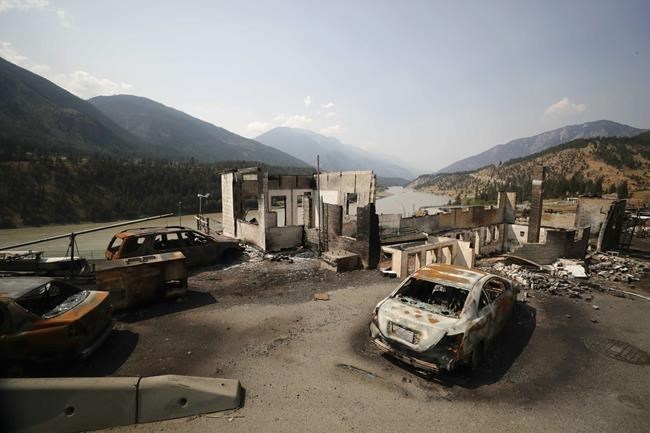BRITISH COLUMBIA - Investigators in British Columbia have zeroed in on two areas of interest for the cause of a fire that razed the village of Lytton.
RCMP said in a news release Monday that investigators completed a "fulsome search" of an area near Lytton that is about one kilometre in radius.
A two-kilometre area in the nearby community of Boston Bar was also searched where physical and digital forensic evidence was collected and witnesses were interviewed, they said.
Police are now focusing on a parking lot and park area that provides access to a foot and rail bridge across the Fraser River, looking for all movements of people, vehicle and train traffic around the time the fire started on June 30.
Eric Stubbs, an RCMP assistant commissioner in the B.C. division, said while they have made significant progress over the last 12 days, the exact cause has not yet been determined.
"We have heard the concerns of those impacted and understand the importance of having answers around how and why the fire started," he said.
"There are still a number of ongoing tasks and forensic analysis that needs to be completed."
Residents had just minutes to leave as the fire swept through the village and nearby First Nations communities.
Mounties said the Transportation Safety Board investigation into the possibility that a freight train set off the fire is a separate probe, running parallel to the RCMP search for a cause.
Two people were killed in the Lytton fire and all others reported missing have been found, although the RCMP release said it's aware that there may be people unaccounted for and they're asking the public to report anyone missing.
There are more than 300 wildfires currently burning in the province with 24 of them ranked as especially threatening or visible.
These include the newly sparked Okanagan Falls blaze, the growing fire that destroyed Lytton and another fire north of Kamloops that has scorched 402 square kilometres of bush in just two weeks.
The Okanagan Falls fire has forced the evacuation of nearly 80 properties, while residents of hundreds of other homes around the lakeside community have been ordered to be ready to go on short notice.
The Thompson-Nicola Regional District has also issued an evacuation order for nine properties due to the Sparks Lake blaze.
Wildfire risk across most of B.C. is ranked high or extreme and Environment Canada has issued another round of heat warnings for parts of the central and southern Interior, including the region where crews are still battling the fire that levelled Lytton.
BC Wildfire Service information officer Taylor Colman said there are many weeks to go in the province's fire season and there's already been double the average number of blazes and three times the area burned.
The province has seen 987 wildfires this year with more than 1,540 square kilometres of land charred, and of that about 1,500 square kilometres is still burning, she said in an interview Monday.
"It's significantly more than what we consider the average," said Colman.
The province would have seen about 490 fires on average at this time of the year with about 500 square kilometres burned, she said.
"You know, it's only July 12," Coleman noted.
The provincial government has also warned that large parts of B.C. are now facing drought conditions.
There is water scarcity and low streamflows on Vancouver Island, in the central Interior and in southern British Columbia due to low spring rainfall and record high temperatures in June and early July.
The Salmon River watershed that drains into Shuswap Lake and east Vancouver Island are experiencing a Level 4 drought, on the scale that goes from zero to five.
It means in those areas, significant, adverse impacts on fish are very likely, and maximum water conservation for all water users and licensees is being urged, the government said in a news release.
The Regional District of Central Kootenay has issued a boil water notice for the Rosebery Highlands Water System. It said low water levels in the reservoir are impacting the effectiveness of chlorine disinfection to remove or inactivate viruses.
Heat warnings issued Sunday by Environment Canada call for above seasonal daytime temperatures of 33 C to 38 C, and only moderately cooler conditions overnight until at least Wednesday.
Colman said the warnings are "concerning" for their fight against the fires.
"We still have quite a few weeks in wildfire season, and what we consider the peak of wildfire season, so we still have a long way to go."



